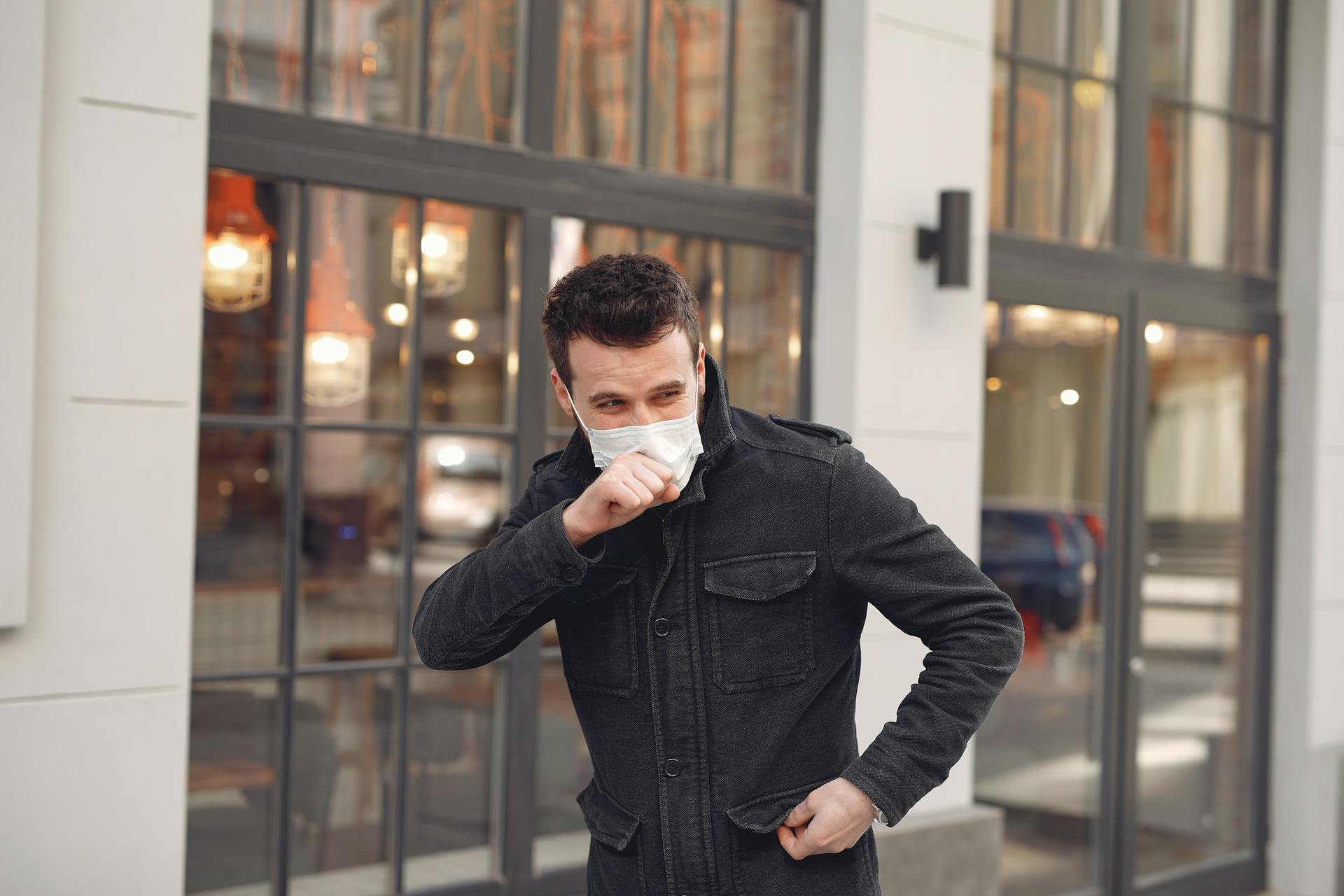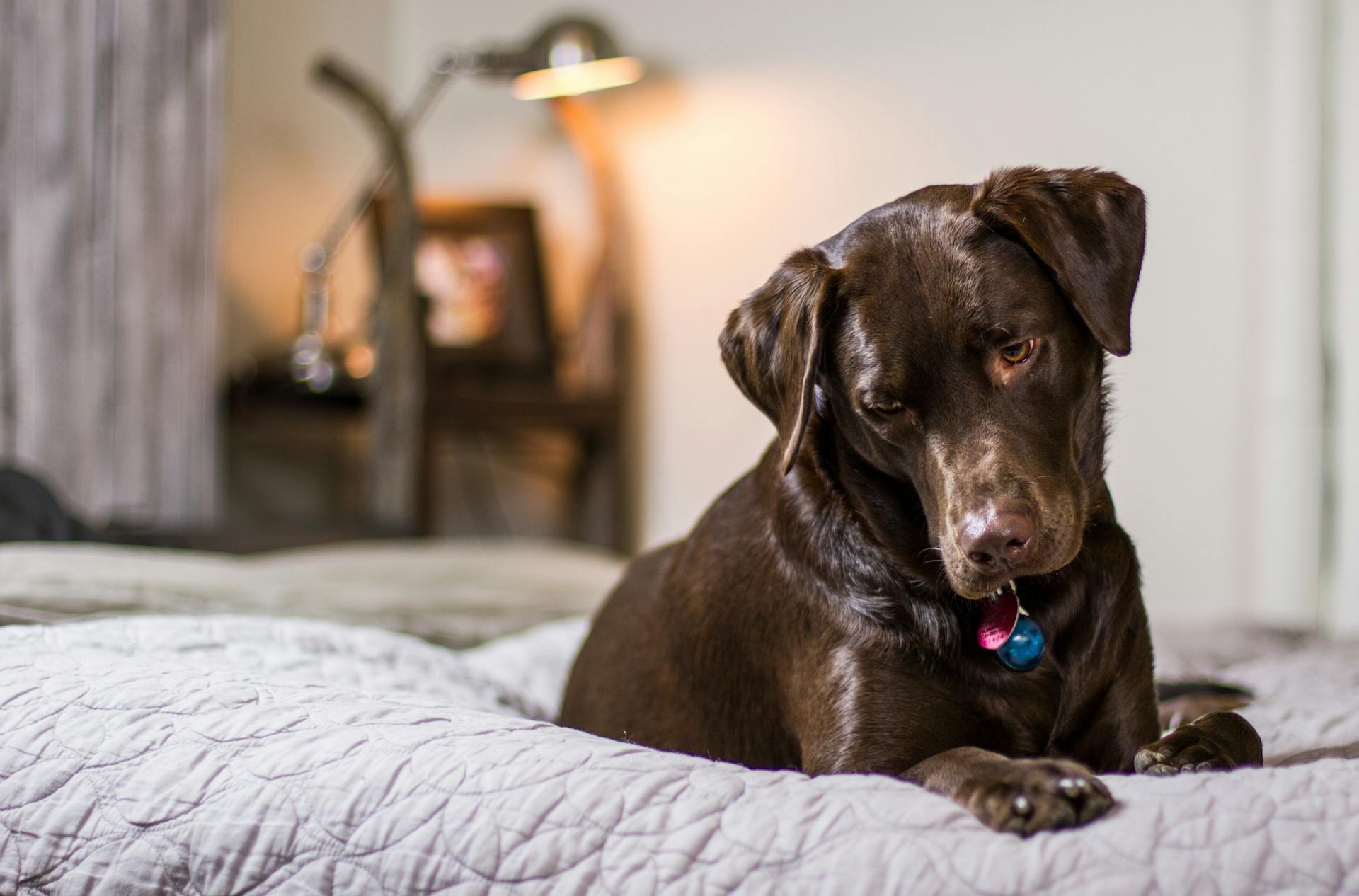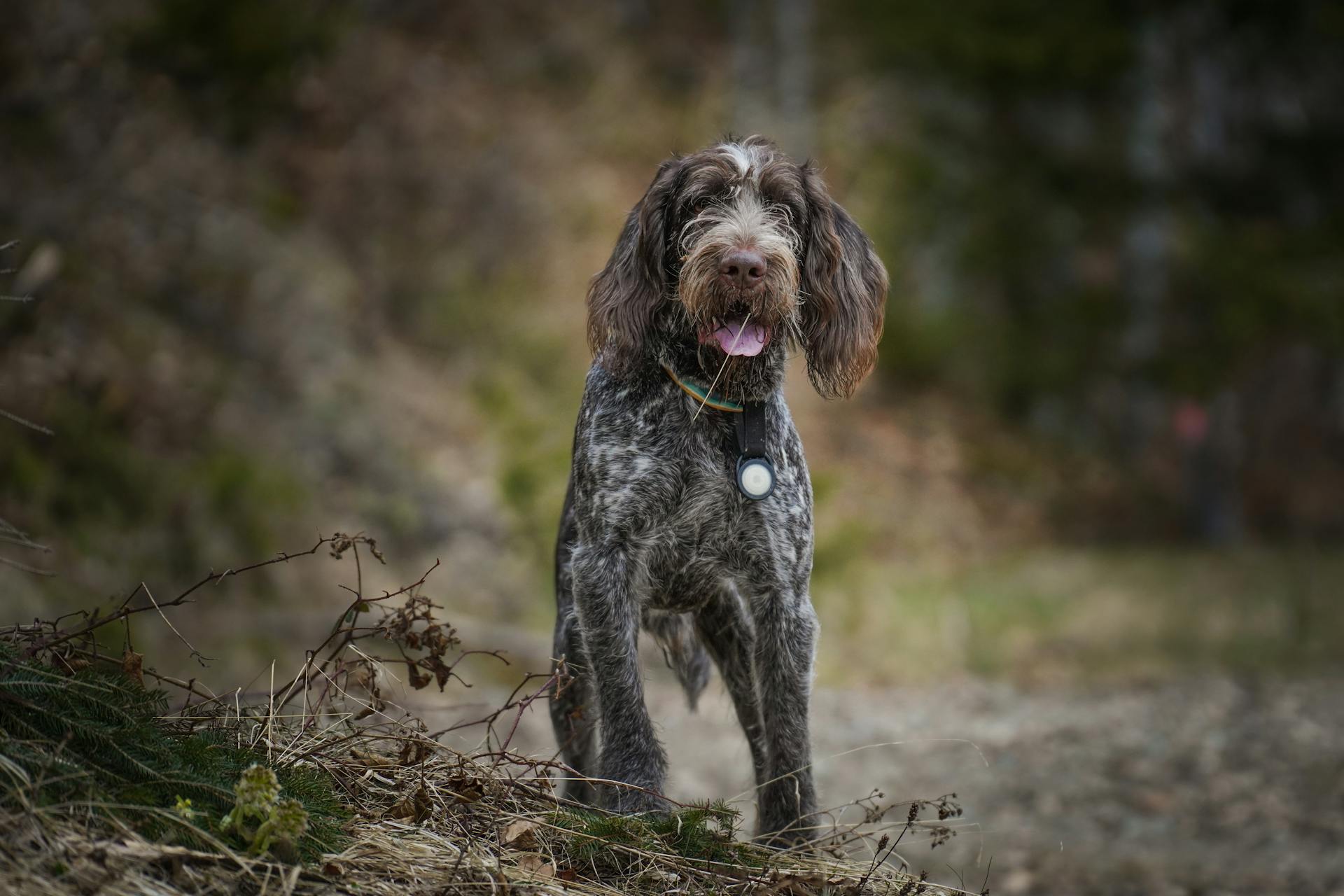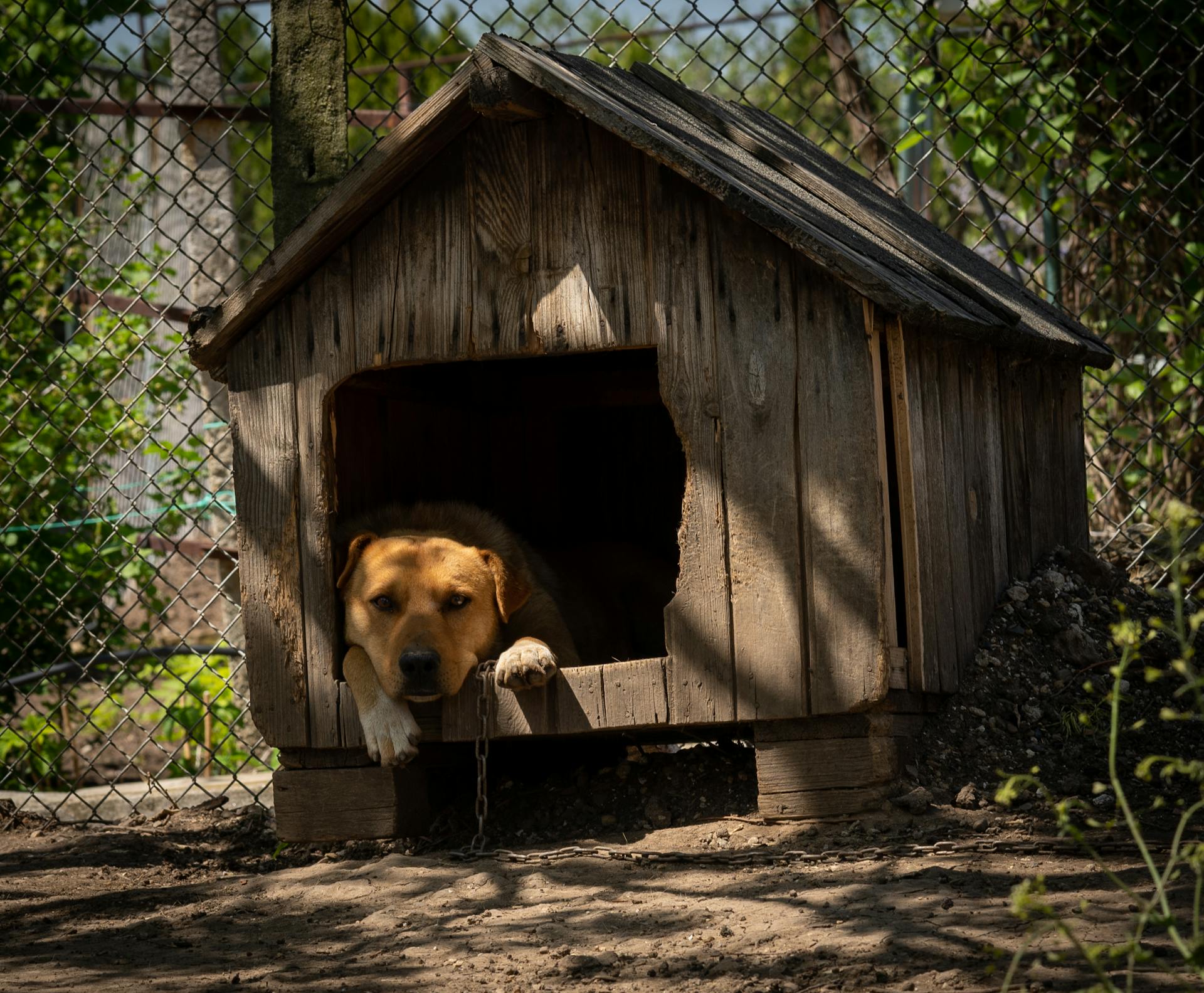
Kennel cough is a highly contagious respiratory disease that affects dogs of all ages and breeds.
The symptoms of kennel cough can range from mild to severe, but most dogs will show some signs within 3-5 days after exposure.
Coughing is the primary symptom, often accompanied by a loud, honking sound that can be unsettling for dog owners.
Common symptoms include runny eyes, sneezing, and a slight fever in some cases.
The cough itself may be dry or produce mucus, and it's not uncommon for dogs to experience a lack of appetite due to the discomfort caused by kennel cough.
What Is Kennel Cough?
Kennel cough is a contagious respiratory disease that affects dogs. It's caused by a virus and sometimes bacteria.
The most common symptom of kennel cough is a persistent, hacking cough that can last for several weeks. Some dogs may also experience a runny nose, sneezing, and loss of appetite.
This condition is highly contagious and can be spread through direct contact with an infected dog's saliva, mucus, or other bodily fluids. It can also be transmitted through the air when an infected dog coughs or sneezes nearby.
Take a look at this: How Long Is Kennel Cough Contagious after Starting Antibiotics
Transmission and Risk
Crowded dog spaces, facilities, and environments can be breeding grounds for kennel cough. Staying in moist, warm, and poorly ventilated areas like kennels, rescue shelters, and boarding facilities increases your pet's chances of contracting the disease.
Exposure to people who come into contact with large numbers of dogs, such as vets, trainers, sitters, groomers, and walkers, can also put your pet at risk. Stress from travel or unfamiliar environments can exacerbate this risk.
Here are some common locations where kennel cough is often spread:
- Kennels
- Boarding facilities
- Dog daycares
- Animal shelters
- Dog spas
- Dog parks (water dishes)
Remember, even you can contribute to spreading the disease if you come into contact with an infected dog and then pet your own.
Spread Mechanism
Kennel cough is spread through various means, making it essential to understand how it transmits.
Direct dog-to-dog contact and aerosols (tiny water droplets) from a dog's cough or sneeze are primary routes of transmission. Even a simple action like sharing toys or food and drinking bowls can lead to the spread of the disease.
See what others are reading: Kennel Cough Spreading
Contaminated surfaces, such as communal pet water bowls near drinking fountains at parks, can also contribute to the outbreak of canine cough. It's best to bring your own water for your pets if needed.
Direct contact with infected dogs, contaminated objects, or even inhalation of airborne particles can lead to viral and bacterial kennel cough.
Risk Factors
Your pet's chances of contracting kennel cough increase significantly when they're exposed to certain environments and situations.
Staying in crowded dog spaces or facilities is a major risk factor for kennel cough. These areas often have poor ventilation, making it easier for the bacteria to spread.
Moist, warm, and poorly ventilated environments like kennels, rescue shelters, and boarding facilities also raise the risk of contracting kennel cough.
People who come into contact with large numbers of dogs, such as veterinarians, trainers, sitters, groomers, and walkers, can unwittingly spread the infection to your pet.
Stress caused by travel or an unfamiliar environment can weaken your dog's immune system, making them more susceptible to kennel cough.
Exposure to dust and cigarette smoke also increases the risk of contracting kennel cough.
Here are some groups that are at higher risk of catching canine cough:
- Puppies
- Geriatric dogs
- Dogs with immune-mediated diseases
- Dogs on immunosuppressant drugs (such as prednisone)
These groups not only have a higher chance of contracting the infection but are also more likely to experience severe secondary complications like pneumonia.
Symptoms and Diagnosis
A dog with kennel cough will usually show some or all of the following symptoms: dry or productive cough (often with foamy mucus), retching or gagging, watery discharge from the nose, and runny eyes.
The first few days are often the worst, as bouts of hacking cough can be triggered by barking, excitement, pulling on the lead, and going out in cold air.
A different take: How Often to Vaccinate for Kennel Cough
What Causes Canine?
Canine kennel cough is a common and highly contagious respiratory disease that affects dogs. It can be caused by various pathogens, including bacteria and viruses.
Some of the most common causes of kennel cough are Bordetella bronchiseptica and Canine Parainfluenza (CPIV). These two pathogens are responsible for the majority of kennel cough cases in dogs.
Here are some of the key culprits behind canine kennel cough:
- Bordetella bronchiseptica
- Canine Parainfluenza (CPIV)
It's worth noting that while these pathogens can cause kennel cough on their own, they often work together to create a perfect storm of symptoms.
Incubation Period

The incubation period for Kennel Cough can be quite unpredictable, taking anywhere from 3 to 10 days after exposure for symptoms to become apparent.
It's not uncommon for this timeframe to stretch up to two weeks in some cases.
Duration
The duration of kennel cough can vary from dog to dog.
It usually takes between 3 to 10 days after exposure for clinical manifestations to become obvious.
This incubation period can last up to 2 weeks in some cases.
Fortunately, if there are no complications, kennel cough resolves within 2 or 3 weeks.
During this time, your dog should be bright, alert, eating well, and lacking fever.
The Signature
The Signature Cough is a telltale sign of kennel cough in dogs.
It's characterized by a forceful, persistent cough that can be dry or produce white foamy saliva. This cough often has a hacking quality to it and may sound like your dog has something stuck in their throat or is trying to clear their throat.
Explore further: Kennel Cough or Something Stuck in Throat

The hallmark of kennel cough is its intensity, which can intensify following physical activity or at night. It's not uncommon for pet parents to describe the cough as if there was something lodged inside the dog's throat and they're choking on it.
Here are some common characteristics of The Signature Cough:
- Forceful and persistent
- Dry or produces white foamy saliva
- Hacking quality to it
- Can sound like your dog has something stuck in their throat
Suppressants
Cough suppressants can provide symptomatic relief and make your dog more comfortable during the recovery phase.
In some cases, cough suppressants may be prescribed to alleviate discomfort if causing the pet to lose sleep due to coughing, or if underlying conditions worsen with coughing. However, these should be used under a vet's guidance as they could mask more severe symptoms or complications.
A short-term solution for kennel cough is treating it with a cough suppressant, but you'll need to talk to your veterinarian about which medicines are best for dogs and how much you should give them.
Oral cough suppressants may be prescribed in mild cases to make your pup more comfortable and help them rest. Sometimes, vets will also suggest placing your dog in a room with a humidifier or a shower-steamed bathroom to provide relief.
Here's an interesting read: Yorkshire Terrier Coughing

Switching to a harness rather than a collar while your pet is symptomatic is a good idea since collars put pressure on their airways and can irritate the throat and increase coughing. Improvement is typically seen within 5-7 days of starting treatment, and follow-up appointments usually aren't needed for mild cases unless symptoms continue or worsen.
Diagnosis and Treatment
Most vets can diagnose kennel cough based on a dog's history and clinical symptoms.
A thorough physical examination will be performed by your vet to rule out pneumonia, which changes the course of treatment and affects the outcome.
In healthy dogs, a couple of weeks of rest is usually enough to help them recover from kennel cough.
Prevention and Vaccination
You can protect your dog from kennel cough with a vaccine that offers protection against viruses like Parainfluenza.
The Protech C4 injectable vaccine is one option that provides this protection, and it's often used in combination with other vaccines to give the best possible coverage.
A yearly vaccination is essential for Kennel Cough, as the immunity provided by these vaccines doesn't last beyond 12 months.
Vaccine
The Protech C4 vaccine is an injectable option that protects dogs from viruses causing Kennel Cough, including Parainfluenza. This vaccine also offers protection against Bordetella bronchiseptica with the addition of the bb variant.
You can choose between different types of vaccines for Kennel Cough, such as the Protech Bronchi-shield III intranasal vaccine that protects against multiple viruses. However, a combination of the Protech C4 injectable vaccine and the Bronchi-shield oral vaccine is preferred for best protection.
Yearly vaccination is essential for Kennel Cough, as these vaccines do not provide lasting immunity beyond 12 months.
Preventing Infections Through Hygiene
Maintaining good hygiene practices can help prevent the spread of kennel cough.
Regular disinfection of common areas and items your dog comes into contact with is essential for preventing infection.
Isolating your dog from other dogs after they've been diagnosed with kennel cough can also help prevent transmission. The typical time for isolation is 2 weeks after the cough resolves.
Recommended read: Skin Care for Dogs with Allergies
Recovery and Prognosis
The prognosis for dogs with kennel cough is excellent if they're otherwise healthy and regularly vaccinated.
For these lucky pups, even if pneumonia develops, the prognosis remains good to excellent as long as treatment is initiated on time. This is a big relief for many dog owners!
However, the prognosis is poorer and usually guarded for dogs with pre-existing respiratory diseases and brachycephalic breeds. These guys need extra care and attention.
Puppies, geriatric dogs, and immune-compromised pets also face a guarded prognosis. It's essential to work closely with your veterinarian to ensure they receive the best possible care.
Recovery from kennel cough typically takes around 3 weeks for most dogs, but senior pets, puppies, and immunocompromised pets may need up to 6 weeks to fully recover. This is why it's crucial to monitor their condition closely during this time.
A unique perspective: Canine Distemper Symptoms in Puppies
Frequently Asked Questions
What is the fastest way to cure kennel cough?
Kennel cough recovery typically takes 1-3 weeks. Rest, hydration, and a nutritious diet can help your dog recover faster
Can humans catch kennel cough?
Yes, humans can catch kennel cough from dogs, but this is a rare occurrence. If you're experiencing symptoms like a persistent cough or fever after being around an infected dog, seek medical attention.
How long does reverse sneezing last with kennel cough?
A reverse sneezing episode with kennel cough symptoms typically lasts from several seconds to a minute. The duration may vary depending on individual factors and underlying health conditions.
Does Bordetella cause reverse sneezing?
Yes, Bordetella infections in dogs can cause a distinctive coughing sound similar to a honking goose, also known as "reverse sneezing". This symptom is often accompanied by eye discharge.
What human medicine can I give my dog for kennel cough?
For kennel cough in dogs, over-the-counter cough suppressants like Mucinex or Temaril-P may provide relief. However, consult a veterinarian before administering any human medication to your dog.
Sources
- https://perthvetcare.com.au/pet-library/kennel-cough-in-dogs/
- https://www.trudellanimalhealth.com/learn/further-reading/kennel-cough-causes-symptoms-treatment
- https://veterinaryemergencygroup.com/blog/kennel-cough-in-dogs/
- https://festivalanimalclinic.com/blog/symptoms-of-kennel-cough/
- https://wagwalking.com/condition/kennel-cough
Featured Images: pexels.com


